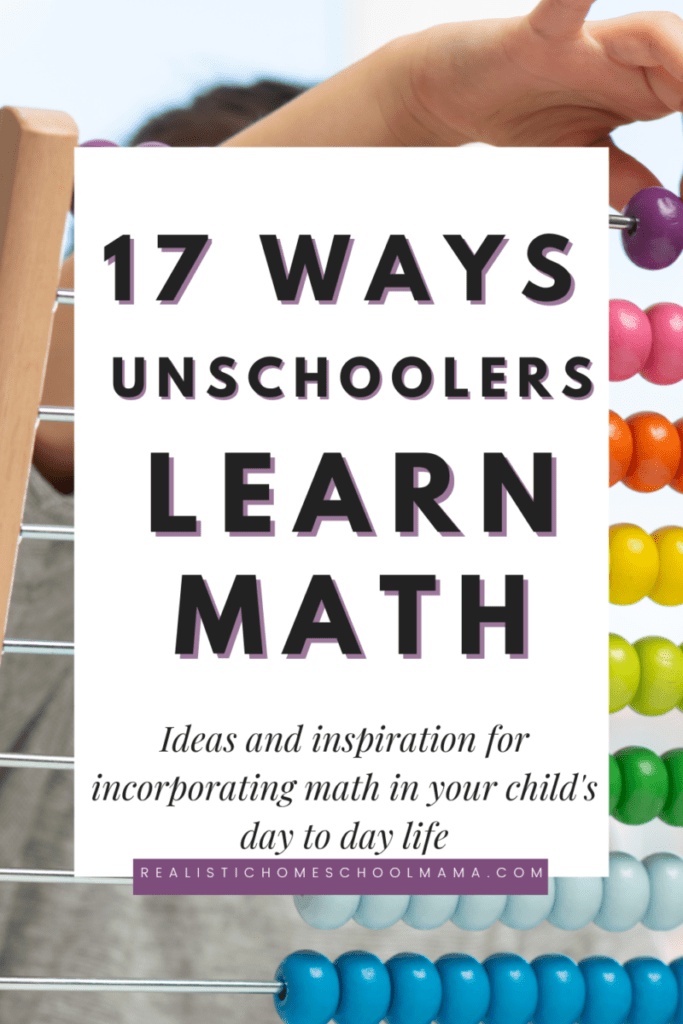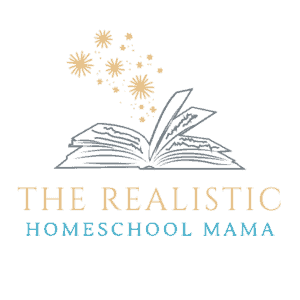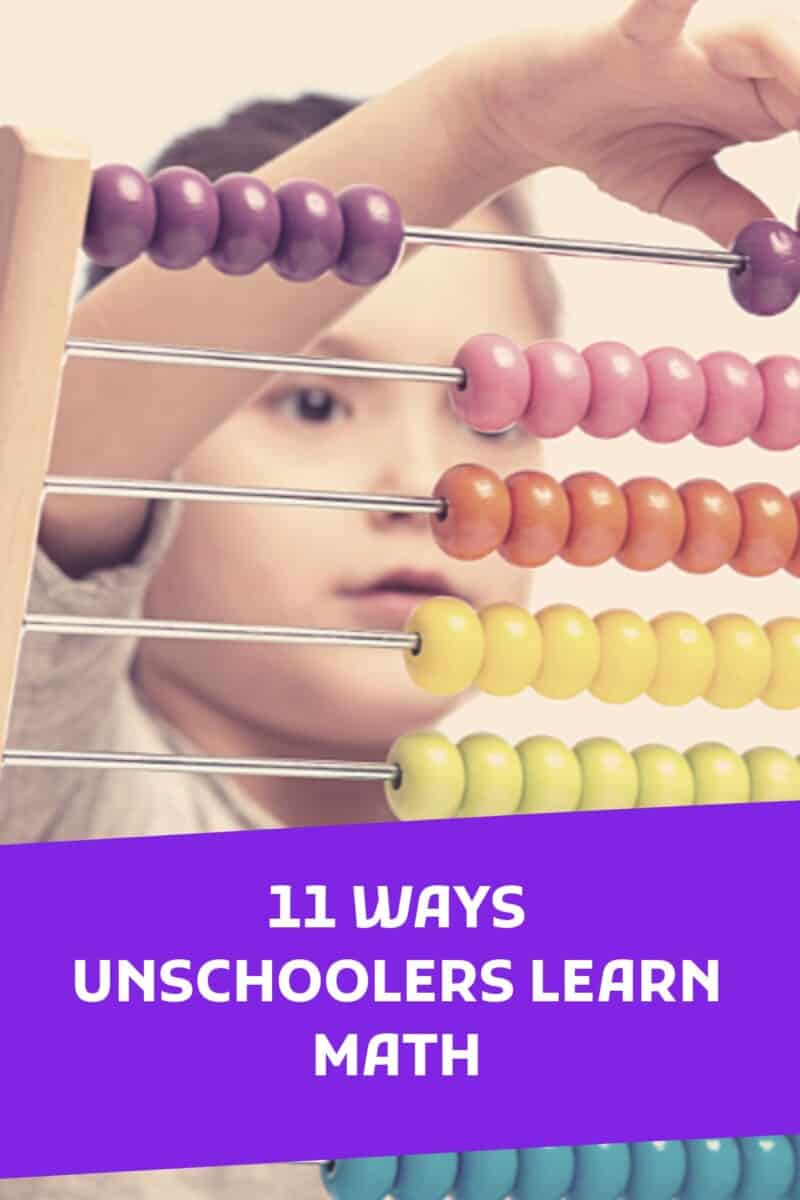Learning math. A hot topic amongst the unschooling crowd. I’m not sure why, but there seems to be a fear that unschooling kids can naturally learn all sorts of things…EXCEPT math.
This is far from the truth! Math is everywhere; the truth is, you can’t live life and not learn basic math. We use it to some degree or another in nearly everything we do. So if you aren’t using math textbooks or worksheets or a math curriculum, how do unschoolers learn math?
Unschoolers learn math through engaging in real life activities that require math skills. Math is not approached as an isolated subject that must be learned in a textbook, rather, basic math is learned through engaging in day to day activities and projects that utilize mathematics.
Here are just a few examples of how unschoolers learn math in their day to day life:
(Still not sure what Unschooling is? Start with this post to learn more about how unschooling works).
1. Cooking and Baking
What child doesn’t love baking chocolate cookies?! My kids regularly help me in the kitchen, where they learn about temperature, doubling recipes, fractions, measurement, time, weight, converting measurements etc.
2. Budgeting
Having a small weekly allowance has been a great took for my kids to learn about budgeting and the value of money.
I will periodically take my crew to the local thrift store, where they use their carefully budgeted quarters and dimes to purchase the treasures they find. Occasionally, they will find a more expensive object that they want, which will lead to a discussion of how much they will need to safe (how many quarters, dimes, etc they will need) and how long it will take for them to save for it.
If you want some great free resources for teaching your kids math, visit my post 27 FREE Homeschool Resources for Every Age and Subject
3. Music
Music teaches math with time signatures, patterns, counting and more. The cool thing about music is that in can create an abstract understanding of mathematical patterns that are subconsciously absorbed.
4. Meal Planning and Grocery Shopping
Grocery shopping and meal planning involves lot of math. Sticking to a budget, comparing prices, percentages, sales and couponing all offer a great math challenge!
Involving the kids in meal planning and grocery shopping can be a great opportunity to learn math. Hand an older kid a pen and paper or a calculator next time you go to the grocery, and put them in charge of holding you accountable to sticking to the grocery budget while you’re shopping. They will love not only flexing their math skills but getting be “boss” for a bit!
5. Event Planning
You’d be surprised how much math is involved in planning a 6 year old’s birthday party! How many people to invite, how many invites/party favors/plates and cups. How many pieces can you cut a birthday cake into? You get the idea 😉
6. Travel
Next time you go on a road trips, bring along an real, paper map and have your kids plan your route, estimate arrival time (speed and distance), work out the shortest route, etc.
7. Garage Sales and Lemonade Stands
The kids will set up a garage sale or lemonade stand a couple of times a year. They find or make things to sell and run their own stands. They’re in charge of pricing items, giving change, figuring out profit, and then figuring out how they want to spend the money they earned.

8. Creating Art
Creating art can involve symmetry, geometry, scaling up or down, ratios and angles.
9. Gardening
We made a small flower and herb garden in the backyard as a homeschool project. We measured the space, then made a list of everything we would need for the garden and calculated how much it would cost to buy. We used graph paper to draw some raised beds to scale and figure out many plants would fit and how far apart to space them, then e researched and priced the different plants.
All in all, I was pretty surprised how math intensive it ended up being, and the kids really enjoyed it.
10. Gaming
Lots of games involve math! My boys love Minecraft and it’s full of it.
11. Tracking Weather
Tracking temperature, rainfall, charting weather patterns throughout the year, etc. can be a great use of practical math.
12. Starting a Business
Starting a business is especially powerful for older kids and teens. I feel one of the most important life skills we can provide our children is a solid understanding of how small business works. Providing real life experience regarding debt, budgeting, taxes and business finances is one of the best math lessons our children can have!
13. Building Projects
Small construction projects require measurements, geometry, etc! Chicken coops, doll houses, dog bed, furniture and treehouses.
14. Sports
At first glance, you might not think sports use math, but it’s a great way to learn statistics and scoring.
15. Board Games
There are so many fun board games that use math! Monopoly, Catan, Sumoku, Farkle, Blokus, Yahtzee, Dino Math Tracks, Prime Climb, just to name a few.
16. Spreadsheets
Making spreadsheets to organize, store, analyze whatever data they’re interested in (time spent playing outside/online)
17. Sewing
Sewing is like one big math problem unto itself! Measurement, geometry, multiplication, estimation, converting units of measurement are are all used when sewing.
Math is Everywhere
There are so many ways that math organically emerges in everyday life! It’s a part of nearly everything we do, and I’m sure you can think of more things to add to this list.
There are big differences between learning something because someone forces you to and learning something because you are interested and it has meaning. Since math is fun at our house, the kids are more likely to want to learn more about it than less. And after that? When they need/want to learn higher level math, they will have the abilities to be motivated, self-directed, and capable learners.
I hope these examples have helped you see how prevalent math is in day to day life. or offered you a little inspiration. I’d love to hear what math looks like in your home?
Curious about learning to read as an unschooler? Check out this post to learn about the unschooling approach to reading.
You might also like: 7 Types of Unschooling (which is most extreme?)
Recent Posts
The freedom to educate our own children in the whatever method we see best suited to their needs is a freedom I do not take lightly, and am eternally grateful for. SO much is available to us, and...
There are a LOT of things about the Charlotte Mason method of homeschooling that appeal to me. However, the theory of intentionally developing good habits in your children is one that I admittedly...



